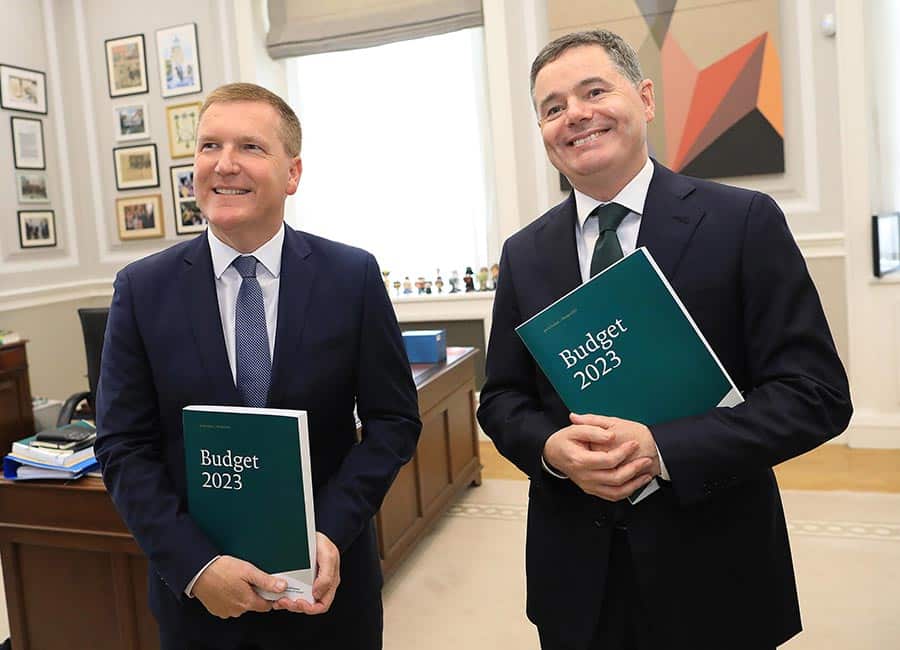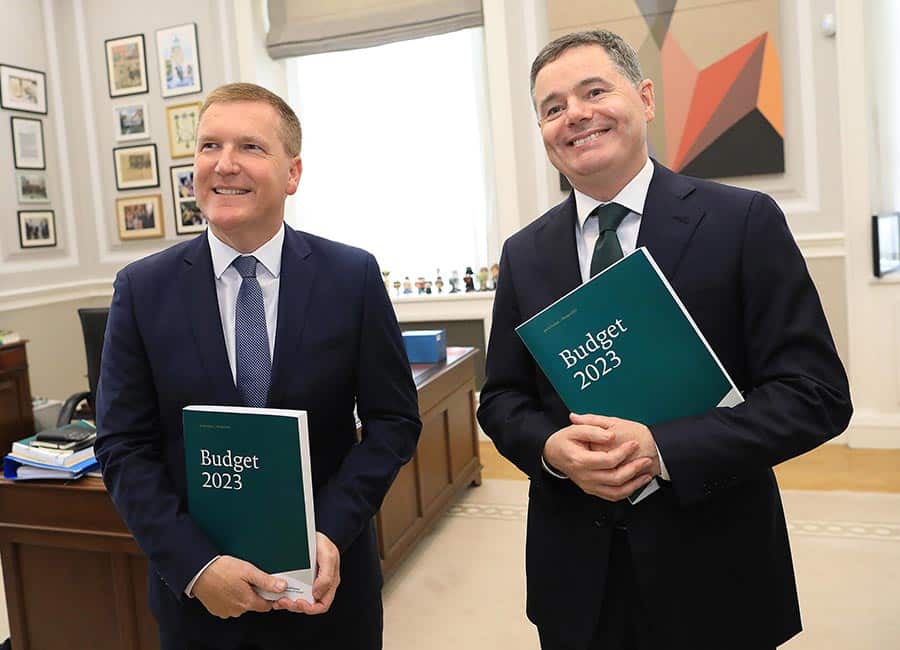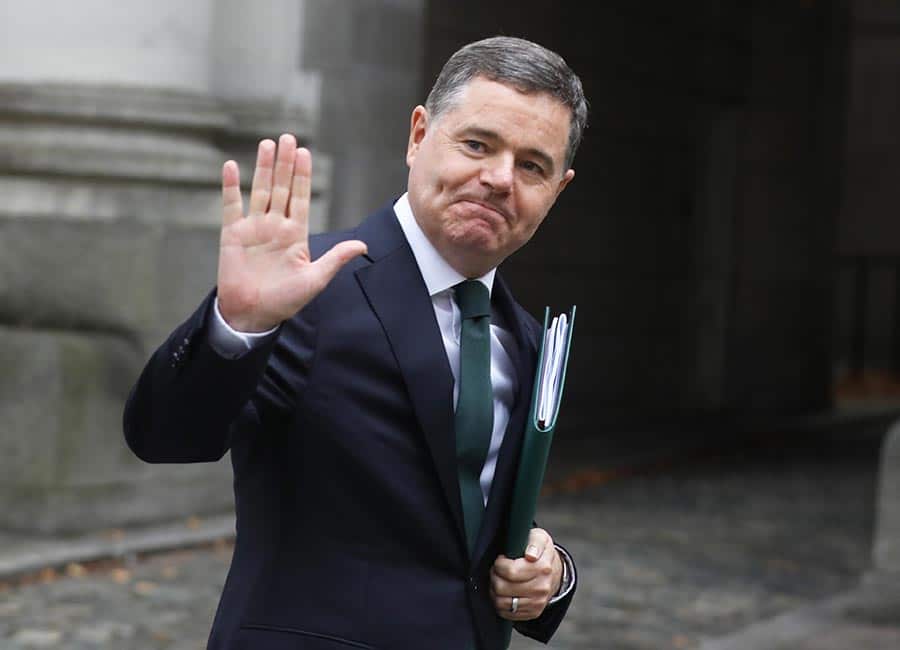Budget 2023 looks very generous in a world reeling from the energy crisis and war on Ukraine. It's the biggest budgetary package of increases in our history. And there are indeed lots of goodies.
Parents will be happy with a childcare spending target now set to hit €1bn - while free primary school books are long overdue. But teacher unions are rightly livid with overall education spending, which Minister for Public Expenditure Michael McGrath glossed over quickly, muttering something about spending €9.6bn this year.
And well he might - last year's spending was €9.3bn. The increase was barely a third of the inflation rate.
Usually with budgets, the devil is in the detail. But this time around, the devil is in the big picture as well.
And it shows there's no giveaway or a bonanza here.
Core spending increases hardly match rampant inflation; the inexorable rise in the cost of living will gobble up most, if not all, of the benefits.
And the way in which money is distributed is not quite fair and honest - and not nearly as generous as it seems.
The government hopes we'll ignore the elephant in the room: inflation. This will average 8.5% this year - and a hefty 7% next year, finance minister Paschal Donohoe told us.
But his tax and welfare changes don't match these figures - so we'll be worse off on those scores overall, although a raft of other measures may compensate many people.
Meanwhile, the government is the biggest windfall profiteer from inflation. VAT soars when prices do. And so do income tax and corporation tax.
State coffers are awash with €7bn in extra revenue this year and next. Giving that money back to where it came from - us - is a windfall tax rightly charged by the government on itself.
It proposes to spend €6.9bn on increases to core spending. And that sounds like a very big number. But when you apply inflation of around 8% to spending of €90bn a year, you get an even bigger number.
Overall, we are really just standing still.
Key budget items such as tax and welfare should just be linked to inflation - called indexation - as they are in many countries (usually the better-run ones).
But that doesn't suit our politicos. They pretend inflation doesn't exist and dispense what seems like largesse, even while announcing tax and welfare changes that leave us worse off when the rising cost of living is taken into account.
Politicians fiercely resist indexation as it removes their ability to pull the wool over our eyes on an annual basis.
Welfare and pension increases of €12 are just over half what they should be if core rates were to keep pace with rising prices.
Inflation isn't a once-off. It builds up year on year.
When you don't match it, that shortfall in core pension and welfare rates is built in forever more. True, there are special payments to pensioners and welfare recipients this year. But dispensing once-off windfalls while effectively cutting core payments after inflation is typical of the insidious nature of politics today. It's all about optics.
Tax is the same. The increase in the lower tax band to €40,000 is an eye-catching measure. But again this increase barely matches inflation and little else has been done to account for it in the tax system.
The cost of protecting our credits, allowances and bands is around €2bn in 2023. And we have got barely more than half that in this budget.
So we will be worse off than before - tax-wise as well as welfare-wise.
While the government ignores inflation in its own tax measures, it's automatically built into the insidious system of stealth taxes it has gradually built up into a shadow tax system.
This certainly is index-linked. There are dozens if not hundreds of them now.
Whenever the government is faced with an expense, rather than increase taxes to cover it, it slaps a levy on a company, which inevitably passes it on to us.
We pay hundreds or even thousands for special levies on electricity, plastic bags, prescriptions, health insurance, life assurance and non-life insurance to name but a few.
Credit unions have no fewer than three of them that must be passed onto members! And the levies go up automatically as a percentage of these rising prices. Next year, they will 'levy' an extra big toll on us at the worst possible time.
This budget added another new one - a 10% levy on concrete. This will raise €80million to assist in financing the redress scheme for pyrite and other housing faults.

But it's just going to be passed on to house buyers, pushing up the cost of new homes in the midst of a housing crisis.
The Society of Chartered Surveyors Ireland estimates the concrete levy will add €3,000 to €4,000 to the delivery cost of an average three-bed-semi.
Another stealth tax is underfunding schools and forcing teachers and administrators, who have much better things to be doing, to chase after parents for a 'voluntary contribution' to meet this shortfall.
Mr McGrath's shame-faced increase in the education budget will ensure this continues.
The government has made vague pledges to finally follow the advice of many of its own experts and index-link the tax and welfare system to inflation automatically.
But it always seems to be put off to some future undefined date - like Saint Augustine famously said when he promised to give up his sins: "Lord make me pure - but not yet!"
The Oireachtas Committee on Budgetary Oversight is the latest heavenly authority to urge the ministers to give up their auld sins - namely 'the ad-hoc nature of the current system of taxation and welfare' where ministers can unfairly reap kudos over sub-inflation increases in welfare and tax credits, bands and allowances.
Perhaps Paschal and Michael intend to wait until just before leaving office to do so - thereby spoiling the annual fun of the Opposition in dispensing fake budgetary largesse.
Their last conjuring act would then surely be worthy of a master magician - booby-trapping a favourite trick to blow up in the faces of their successor!
+ Bill Tyson is a columnist with the Irish Daily Mail










